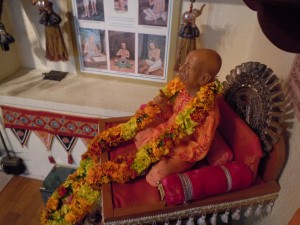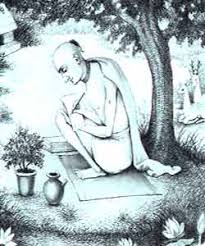Hare Krsna-
There have been some writings circulating recently by devotees within and outside iskcon about how iskcon should adopt a dual guru system, namely new people should be allowed to accept Srila Prabhupada as their initiating guru or they can accept some gbc certified (accept at your own risk) spiritual master. This idea is not very intelligent and one who reads further and hears the advice given by Bhaktivinode Thakur will see why.
Hare Krsna
damaghosa das
——————————
Jaiva Dharma by Srila Bhaktivinode Thakur--starting on pg 110 Sarvabhavana das translation
Note I have from the book, directly typed this text below, so please forgive any typos)
SB 11.2.46-Madhyamas—“isvare tad-adhinesu, balisesu dvbisatsu ca, prema maître krpopeksa, yah karoti sa madhyamah”
An intermediate or second class devotee called a madhyama offers his love to the Lord, is a sincere friend to all the devotees of the Lord, shows mercy to the ignorant people who are innocent, and disregards those who are envious of the Lord and His devotees.
(I have skipped the first three items because they do not apply to this article at present)
…Now we come to the fourth quality, upeksa, indifference neglect and avoidance of those who are envious.Firstly an envious person has to be defined and the different types of envious persons have to be delineated. Dvesa, enmity is an unfortunate human trait also know as matsarata, envy and hate. This heinous propensity is the exact opposite of prema(love for Krsna).
Antipathy against the Lord is known as dvesa of which there are 5 kinds. 1.skepticism, not having faith in God. 2. the belief that the Lord is nothing more than a natural potency of the creation which automatically brings about results of ones karma. 3. Not believing in the transcendental form of the Lord. 4. not accepting the position of the jiva as eternal servant of the Lord and 5. absence of mercy.
How should devotees deals with such persons? It is recommended one should avoid their company. Upeksa means neither that one should put a stop to all the usual human exchanges nor that one should refuse help to such bewildered persons. On the contrary if an envious person is in danger or in distress, everything should be done to ameliorate his agony.
How then is it possible for a grhastha vaisnava with one final stroke to curtail all simple day to day interactions with this envious lot? This is not the meaning of upeksa. Upeksa is to terminate all spiritual exchanges with them, not social exchanges.
As a result of ones karma the resultant material reactions from previous lives even some of ones own family members may be dvesis, envious persons. Should they be excluded? No- that is not the solution.
Social exchanges are part of human behavior so the envious persons should be dealt with but without getting into deep involvement or emotional relationships with them. In contrast for spiritual practice serious commitment is mandatory and spiritual association with ones fellow devotees means to interact upon the spiritual platform by discussing transcendental topics thereby serving and assisting one another in progress.
An envious person is generally very self opinionated-hence if he hears praises or explanations about the science of pure bhakti he will immediately start an unnecessary argument, which will be of use to neither you nor to him.Instead of such barren debates, one should simple restrain ones dealings to a social level with such persons.
If someone whimsically proposes to include the envious persons into the ranks of the balisa, so that compassionate association may be practiced upon them, then such a person should first understand that this course of action would be very detrimental to his own spiritual progress. It is essential for the madhyama to act according to these 4 guidelines as any slackness in this regard will culminate in malpractice, increased lethargy and apathy towards executing spiritual discipline. In the end the deviation will become too overwhelming.
Thus in accordance with scriptural injunctions the prime duties of a madhyama vaisnava are to cultivate love for the Lord, friendship with pure devotees, compassion for the innocent and aloofness from the envious.
(Note-this below is a later ques-answer exchange between a bona fide spiritual master and his aspiring disciple that the Thakur sets up to explain some points about good or bad association.)
Question-Many kanistha bhaktas do not progress, what is the reason for this?
Answer– If the kanistha bhaktas dvesi sanga-association with the inimical agnostics, atheist and impersonalists, etc is frequent, very soon he loses the kanistha status and becomes entangled in the pursuit of karm and jnana, etc. In some cases the kanistha neither progresses nor regresses, just remaining at the kanistha level.
In cases where both sadhu sanga and dvesi sanga exercise equal influence upon the kanistha, his bhakti maintains the status quo.
Question-What ensures steady progress?
Answer– When devotee association is frequent and powerful and non devotee association is minimal, the kanistha progresses swiftly.
————————–
Words of wisdom from Bhaktivinode Thakur from his various writings on this point of dual gurus systems and bad association.
Srila Prabhupada: You should not imitate great personalities like Bhaktivinode Thakura, but you must follow His footprints. But it is not always possible to have the same success as great personalities like Bhaktivinode Thakura achieved. So in all circumstances you should try to follow the footprints of authorities but never to imitate them. Srila Prabhupada letter 20 September, 1968 :
What is the most harmful association in the world?
– A dharmadhvaji is a person who has no actual devotion or renunciation in his heart but makes a show of it externally. He wears the clothes of a devotee to accomplish materialistic ends in a duplicitous manner. There is no worse association in the whole world than that of a dharmadhvaji. One should rather associate with sense enjoyers.
Being deceitful, the dharmadhvajis take on the appearance of devotees with a desire to cheat everyone, and to fulfill their crooked desires, they cheat the foolish by helping them in their rascaldom. Some of the dharmadhvajis become gurus and others become disciples, and by trickery, they accumulate wealth, women, false prestige, and material assets.
If one gives up the association of crooked hypocrites, one can honestly engage in devotional service. (Sajjana-toshani 10/11)
What about those who who put on external signs of devotion?
– Hypocrites are those who do not accept that devotional service is eternal, but they always display external signs of devotional service. Their goal is to accomplish some remote purpose. (Caitanya-siksamrta 3/3)
Those who put on external signs of religion but do not follow the religious principles are imposters. There are two types of imposters: cheaters and fools, or cheaters and cheated. (Sajjana-toshani 10/11)
– Who are sinful and cheating on the pretext of being an Acarya?
Pseudo ascetics and hypocrites give others mantras and pretend to be Acharyas, but they engage in various sinful activities. Detached Vaishnavas must develop extremely pure characteristics. (Sajjana-toshani 5/10)
What are the characteristics of cheaters who imitate successful devotees?
Some cheaters dress themselves as successful yogis and thus cheat the world. They search after sensual happiness and try to increase their own glories by living their lives as yogis. Because chanting the Holy Names of Hari is the constitutional duty of the devotees of Krsna, the cheaters artificially preach the principles of kirtana, and they act whimsically in regard to the religious activities of real yogis.
…They engage in various material enjoyments and create illusion in the minds of ordinary people, but these material activities cause their own downfall. They artificially cry and fall unconscious during kirtana, and they become more materialistic than ordinary people. They become proud of being devotees, on account of accepting the dress of a Vaishnava and the signs of the renounced order of life.
…They can therefore never approach the pure Vaishnavas, and they take shelter of and associate with worldly abominable people. Even though they are averse to glorifying the qualities of Krsna, they sometimes manifest artificial symptoms of ecstatic love, such as shivering while dancing in the kirtana. Day by day, these activities become the object of their enjoyment. (Bhajanamrtam).
Are the Khadajathiyas or the followers of the Synthesis philosophy, pure devotees?
As soon as these people see the devotees, tears flow down from their eyes and hairs of their body stand on end. Sometimes, when they discuss the topics of the Lord, they fall unconscious. In a religious assembly, they support religious sentiments. Sometimes, they become fully absorbed in material enjoyment and act like madmen. They are not only committing aparadhas at the feet of Bhakti-devi by teaching such behavior to other people, but they are also ruining their own lives. (Sajjana-toshani 8/10)
Natural Brotherhood (Bhaktivinoda Thakura):
“Gradually, when the offensive portions of the established religions are destroyed, there will be no more differences in the bhajana performed by the various Sampradayas nor any quarrel between them. Then as brothers, the people of all castes and countries will spontaneously chant the Holy Names of the Supreme Lord together. At that time, no one will hate anyone or consider others dogeaters; nor will anyone be overwhelmed by the pride of high birth. The living entities will not forget the principle of natural brotherhood.”
Some Conclusions-In the above quotes we have tried to show from mostly Bhaktivinode Thakurs writings how this dual system of gurus within iskcon will simply not work. On a practical managerial level is causes dissension because a disciple from one guru will not accept instructions coming from another gurus disciple, and nothing will get done. Very easy to understand.
However it may be a little more difficult to understand the subtle ideas Bhaktivinode has here presented above. The fourth characteristic of an aspiring devotee, is to avoid/neglect the envious person . He gives some definitions of an envious person. That could be expanded to mean that envy of God(our original problem) also goes to Gods chosen representative on earth as spiritual master or bona fide guru. If mankind does not accept the chosen representative of the Lord for whatever reasons, that person is deemed envious and unfortunate. So if you put the envious and non envious together in some temple, you will have only constant fighting.
As we see today in so many iskcon temples so much cheating is going on, so much false pretending to be “Gods representative” here on earth, so many fall downs, so much illegal activity in the name of religion, etc etc. The list of hypocrisy is practically endless. And then add to these people,in one temple, those who want only Srila Prabhupada?
Therefore a dual guru system is the most unintelligent thing I have heard so far. It will only increase the problems we now see. Just having a guru option button an aspiring “devotee” can push when he enters some temple means the so called authorities themselves do not know what is a real or bogus guru themselves, otherwise why do they give a complete neophyte, who knows next to nothing, this option? If someone wants to live in the gray shadows of maya or illusion that is his choice, but not one chosen by the Lords own representative, Srila Prabhupada. The devotees living in iskcon temples today all have access to what is supposed to a bona fide guru, but they have chosen to remain apart from that proper understanding. That means they are envious because they will not accept the arrangements given to mankind by the Supreme Lord. There are 10 offenses to chanting the Holy names and these devotees disobey most of these 10 offenses if you analyze it carefully.
Therefore how can one who is so offensive to the Lord (and His Name ) and His devotee (the spiritual master and his real disciples?) not be envious?? Therefore they are to be avoided if they cannot be rectified.



